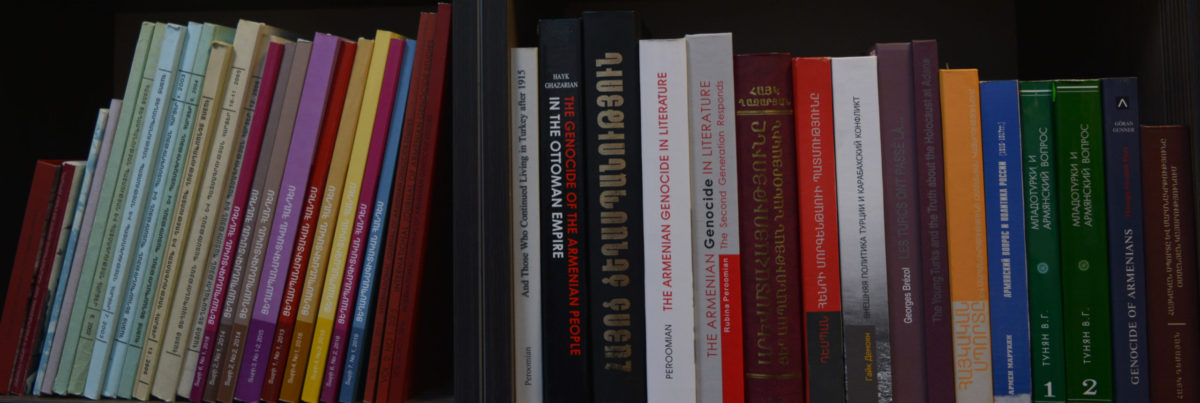
ARTICLES
Suren ManukyanDeputy Director of the Armenian Genocide Museum & Institute (Yerevan, Armenia) as well as lecturer at the departments of History and Oriental Studies of Yerevan State University. His current research focuses on the social-psychological dimension of the Armenian Genocide. It is based on his Fulbright research project “The Sociology of Armenian Genocide: Perpetrators, Bystanders, and Rescuers vs. Victims, Survivors, and Betrayers” conducted at the Center for the Study of Genocide and Human Rights at Rutgers University, New Jersey.
He is a member of the International Association of Genocide Scholars and he was director of the IAGS’s twelfth conference “Comparative Analysis of 20th Century Genocides” (Yerevan, 8-12 July 2015).
Pages 5-26
Timothy WilliamsResearch fellow at the Centre for Conflict Studies at Marburg University and receives a doctoral research grant from the Heinrich Böll Foundation. In 2015, he was the Raphael Lemkin Fellow of the Armenian Genocide Memorial-Institute in Yerevan, Armenia. He studied at Mannheim University (BA Political Science) and at the London School of Economics (MSc Comparative Politics) and he is the Executive Director of the non-profit organisation Beyond Violence (www.beyondviolence.org).
Pages 27-52
Abstract
The study of the motivations of the people participating in genocide is necessary to fully understand the dynamics of genocide and its genesis, as these are the people who actually implement genocidal policies and provide its material manifestation. This paper looks into the motivations of mid-level perpetrators of the Armenian Genocide through the verdicts of the Ottoman Special Military Tribunal which was established in 1919. It is found that opportunistic motivations dominated for perpetrators’ participation, particularly the opportunity for material gain, rape, forced marriage, free labour and career progression. However, the ambiguous nature of authority, coercive structures and ideological tenets also provided a framework within which perpetrators could become motivated to participate.
David LowA Manoogian Post-doctoral Fellow with the Armenian Studies Program at the University of Michigan. He was awarded his PhD in 2015 by the Courtauld Institute of Art, London, for a thesis on photography during the late Ottoman period and the Armenian Genocide.
Pages 53-72
Abstract
This essay explores the evolution of photographic constructions of Armenian identity and the place of Armenians within Ottoman society through a comparison of images made in the aftermath of the revolution of 1908 with those produced during the 1915-16 period. In the earlier period, recurring motifs of return and reconciliation can be discerned, with there being pictured a new, inclusive Ottoman society. While Armenians were depicted as a vital element within post-revolutionary society, the photographic medium simultaneously identified those that that were thought not to belong and was complicit in their social exclusion. During the Armenian Genocide, photography was employed in a similar visual strategy, with Armenians finding themselves in a changed position, being targeted by the lens and marked as lying outside of a reconceptualised Ottoman society.
Edita GzoyanSenior researcher at the Armenian Genocide Museum-Institute. She has a PhD in International relations from Yerevan State University and LLM from American University of Armenia. She is an author of a monograph and nearly three dozens of articles related to legal, historical and gender aspects of the Armenian Genocide.
Pages 73-87
Abstract
This article examines Genocide denial under the constitutional law, mainly the conflict between constitutionally protected rights of freedom of speech and dignity/equality. The comparison reflects the attitudes of three European States – Germany, Spain and France. The Article discusses the history and background of anti-Holocaust laws in the concerned countries and possible criminalization of the Armenian Genocide denial. If further concentrated on the Constitutional Court decisions, which are marked with differences connected with factors such as history, morals, values of the particular society and, of course, politics.
BOOK REVIEWS
Robert TatoyanArmenian Genocide Museum-Institute
Pages 88-101
Stefan IhrigUniversity of Haifa
Pages 102-104
REVIEW
Serafim SeppäläUniversity of Eastern Finland
Pages 105-115

All works in the "International Journal of Armenian Genocide Studies" are licensed under a Creative Commons Attribution-NonCommercial 4.0 International License.